Raymond Horn Photo by Imani Khayyam.
Each Father's Day, we present the Guys We Love issue, which highlights men who are making a difference in the community. This year's batch is no exception. In this issue, we have everything from the University of Mississippi Medical Center's director of medical students for anesthesiology to a mixed martial arts champion to a barber who wants to use his skill to help the youth of his community. Each of these men, father or not, makes a difference in our community just doing what they do, whether it's helping people get fit to fighting for social justice or even offering Jacksonians something as simple as coffee. They are only a few examples of the great men in the Jackson community, but are outstanding ones, nonetheless. Celebrate the important men in our lives this year by getting to know these gentleman.
Marshall Lee Thompson Jr.
Marshall Thompson Jr. wants you to fight your way to a better life. At 34, the Jackson native is the owner of Marshall Arts Mixed Martial Arts Academy (3565 Wheatley St., #5C), a MMA gym and fitness boot camp.
Thompson graduated from Jackson State University in 2004 with a bachelor's degree in psychology. In the fall of this year, he plans to attend the university as a doctoral student of clinical psychology. (JSU's program does not require a master's degree). Thompson says he wants to use his background to help foster better mental health in his community. He believes that issues like obesity can be linked to poor mental health.
"Not only do we need recreational things to do in the community; we have a lot of problems in the community because people are not getting the mental help they need," he says. "A lot of the people who need it can't afford it."
In 2006, Thompson moved to Washington, D.C., as a kickboxer and amateur mixed martial arts fighter.
Thompson says he started fighting after graduating since he wasn't eligible to play college basketball. He spent his college years working multiple jobs, such as night shifts at United Parcel Service from 2000 to 2007 (he also did them from 2012 to 2014), and he had his own barber business, Cuts on Wheels, on campus while in college. In 2007, he became the World Kickboxing Association amateur MMA champion. He also has a black belt in tai jitsu, which is a combat skill that doesn't use weapons.
In 2013, Thompson moved back to Mississippi and began a mentorship program in south Jackson, coaching young men in his community.
In December 2013, he opened his gym, which now has more than 100 members of all ages and physical ability. He hopes that one day, it will focus on more than just physical exercise. "I want it to be an active school of performing arts in Jackson, to not only have the boxing, the kickboxing, and all those things, but all the other arts—the dance, acting, theater, everything," he says.
Thompson says he's always been a helper and a motivator. He wants to encourage people to build new lives for themselves and to take control of their futures. When he isn't training or coaching, Thompson likes to visit the Mediterranean Grill (730 Lakeland Drive, 601-366-6033) and listen to live music, poetry and comedy.—Maya Miller
Felder Rushing
Felder Rushing has an agenda; he just doesn't want you to notice it.
"Change the world, not fine-tune it," says the host of Mississippi Public Broadcasting's "The Gestalt Gardener." His yard is a spoil of floral riches: pink roses, old burgundy canna and assorted succulents, to name a few. Bottle trees—wooden-limbed structures garnished by empty glass bottles where leaves tend to be—spot the backyard.
The space, which Rushing has cultivated over 32 years, is a physical testament to his philosophy of slow gardening, an approach he founded. Slow gardening implores gardeners to savor the basic holistic benefits of their time in the yard, like the smell of the flowers, the wonder of the colors and the idiosyncratic traits of each and every plant.
"I push for garden-variety gardening," Rushing says. He steers listeners to the wonders of slow gardening with his mellow disposition and convenient gardening suggestions, like, if you have to prune all the time, maybe switch to a more suitable plant, and try gardens that don't require pesticides.
For garden tips of greater magnitude, Rushing practices deconstruction, though environmentally sensible techniques such as slow-drip irrigation and composting can be tough sells to many Mississippians. Denouncing the prim gardening viewpoint is what Rushing has preached since he first moved to Jackson as an Extension Service urban horticulture specialist with Mississippi State University, where he received a bachelor's degree in horticulture and a master's of education.
Both of Rushing's parents were avid gardeners, but the retired horticulture professor, world-traveling lecturer and author of 18 gardening books, credits his great-grandmother with shaping his life's passion. Growing up in Indianola, a young Rushing his grandmother made him smell the daffodils in her garden.
"Now, each time I smell them, I become a kid again and think of home and her," he says.
The importance of smell, of enjoying the simple pleasures of plants is a lesson Rushing passed on to his own two children, Ira and Zoe, in their youth.
"I made my daughter smell a Magnolia tree every time we passed one," Rushing says. "That way, no matter where she is, she'll think of me; she'll think of home."—Brian Gordon
Raymond Horn
Raymond "Ray" Horn says that while most people use hot water to make coffee, his mother's way of making coffee was to keep it in the refrigerator in an old whiskey bottle until it was cold. Now, it is the same process the New Orleans native uses to make his brand of coffee, Mississippi Cold Drip Coffee and Tea Company—minus the whiskey bottle, of course.
"Being from New Orleans, it gives me a love for both food and beverage, and we like our coffee very strong," Horn says.
Horn, 55, has been in the food business since he was 16 years old. He was a chef at Cowboy Way Barbecue in Palm Springs, Calif., and has owned a series of restaurants in places such as New Orleans.
While living in California, Horn found it wasn't the easiest place to find a good cup of joe. "... So I started making it," he says. "I would let my friends and co-workers try it because they hadn't really had cold brewed coffee, and they suggested I try selling it."
The process of making the coffee in cold water lowers the acidity and allows it to retain more caffeine. Horn allows the coffee to steep in a large pot for about 24 hours before grinding the spices down and filtering it. It can be served either hot or cold, and his Chai tea has a blend of spices such as cardamom, ginger, cinnamon and clove, to name a few. Each spice is used to give the beverages a kick of flavor. Some of his famous coffee and Chai blends are the Ray Au Lait, Mississippi Mocha, Mil St. Vanilla, Chai and Control Yourself, and Dirty Chai, which is a mix of coffee and Chai tea. His product can be found in farmers markets and at festivals in Livingston in Madison County, Madison, Clinton and Brandon as well. Horn says his next venture for Mississippi Cold Drip and Tea Company are drinkables that his customers can enjoy on the go.
Horn says Cold Drip's new location in midtown offers a great place for him to start the growth of business and helps cater to his demographic of students, artists and lovers of coffee. He says the experience of getting started with a farmers market, Millsaps College and Midtown Partners has not only made him feel welcome in the Jackson business community, but that he is a part of something fresh.
"It's something that's new and exciting that'll continue to grow and inspire and motivate other entrepreneurs," he says. "All it takes is to act on one idea."—Deja Harris
Adofo Minka
In the third grade, Adofo Minka found a book in the library of his school, Northview Elementary School in Jennings, Mo. Susan Altman's "Extraordinary Black Americans: From Colonial to Contemporary Times" (Scholastic Library Publishing, 1989, $9) featured names of important African Americans that mainstream history washes over: Marcus Garvey, Denmark Vesey, Nat Turner, Fannie Lou Hamer, Sojourner Truth and Ida B. Wells. Minka says the book sparked his consciousness.
Minka, whose birth name is Bryan Weaver, adopted his African name as an affirmation of his cultural identity. "... I felt that it was culturally incorrect to have a European name when my ancestors did not originate from Europe," he says.
Through his studies of Malcolm X's autobiography and speeches, he says he found a deeper understanding of the African people in America. He learned about how names were imposed on Africans once they were enslaved and sold. In many instances, the names the African carried before their enslavement were lost.
"I figured although I may not be readily able to find out ... the name my ancestors had before being brought to America, at least I can adopt a name from an African ethnic group that identifies attributes and characteristics that I would like to live up to," he says. "Adofo Minka is a name from the Akan people in Ghana West Africa and literally means 'a brave person who loves justice.'"
After he graduated from ASU, in 2009 with a bachelor's degree in history, Minka attended law school at St. Louis University and finished in 2012. That summer, he married Shanina Carmichael and moved to Jackson, where he worked as a clerk for Lumumba & Freelon Associates, the law practice of late Mayor Chokwe Lumumba. Minka has been practicing law for a little over a year. He works criminal cases and a few civil cases.
Minka, 28, often misses St. Louis and worries about his 2-year-old son, Amari Chike Adisa Minka, who rarely gets to see his grandparents, but when he thinks about his mission, he remembers why he must stay in Jackson.
"We continue to draw the conclusion," Minka says, "that it is worth being here because of the work that needs to be done in Jackson and the type of oppression that is evident in (the state). We have seen in Missouri that the oppression is heavy there, but I believe that Mississippi is one of the places that the backbone of oppression can be broken."—Zachary Oren Smith
Taha Merghani
Thinking of some of the difficulties he faced in coming to America, student Taha Merghani, 21, recalls his school days in Sudan. His English teachers never lived in an English-speaking country. Though his tutors might have only known broken English and his family was reluctant, that did not stop Merghani from being brave enough to come to America to pursue higher education.
"(My family) said, 'You're too young,' (but) when they saw my determination they were like, 'OK yeah, we really wish you the best we can support you and your dreams,'" Merghani says.
He is a junior at Jackson State University, where he is studying to receive a bachelor's degree in computer engineering. At the start of his application process, Merghani sought help from the U.S. Embassy's ambassadors in Sudan, who became mentors for him. After JSU offered him a full scholarship, studying in Mississippi was the obvious choice.
For Merghani, a full scholarship is not even his most prestigious achievement. Similar to the ACT or SAT, in Sudan, the senior high-school students take a nationwide standardized test called the National Board Examination.
"I was aiming for the highest I could get, and I worked hard for it," Merghani says of the test.
His hard work paid off.
During his senior year, he received the highest score of all the students who took the test that year.
Merghani's dedication to his academics extends past the classroom. In June, he will begin an internship at the Massachusetts Institute of Technology, where he will participate in MIT Summer Research Program. While there, he will have the opportunity to do research to help further develop the technology for computers to understand human language.
For his career path, Merghani wants to work further with research either in the field or a school setting. As a second-language English speaker, his work could help others like him as he develops better computer-human interaction and machine learning, a field of study that aims to give computers the ability to learn without explicit programming.
"Siri needs some work," he says. "It should not only be English, but it should have endless dialects and better user perspective for someone who really needs the language."—Emerald Alexis Ware
Dr. Mack Woo
Though he is humble, Dr. Mack Woo is a very interesting man.
The director of medical students for anesthesiology at the University of Mississippi Medical Center is a native of Belzoni, Miss. His mother, May Woo, and father, Ming Sam Woo, came to America from mainland China in the 1950s.
His great-grandfather, Lin Yin Woo, owned a grocery store in Belzoni called Lin Yin Food Mart. After the Communist Party of China took over in 1949, Woo's grandfather, Jimmy Woo, decided to bring the whole family to America.
Mack came to Jackson in 1996 to go to pharmacy school at the University of Mississippi Medical Center and finished in 2005. He completed his residency at UMMC in 2010. He says it was a challenge to complete all of his education.
"The teachers here in Jackson in medical school and pharmacy school have inspired me to not give up," Mack says.
Although Jackson isn't exactly as small as Belzoni, Woo says he still feels a sense of community in the capital city.
"I love the people; it's a big family," he says. "It's a community and we look out for each other, just like the Delta."
He likes to know that he gives back to the city of Jackson, not only through anesthesiology, but also by training future physicians. The professor mentors high school and college student from all over Mississippi.
Mack credits Jackson as a major part of his life because he met his wife, Samantha Woo, who owns Woo Couture. They have two children, Samuel and Matthew.
Woo says he has given so much to the community of Jackson because the city has contributed to his life.—Joshua C. Clayton
Brandon Young
Often, people do not figure out what their profession will be before they graduate from high school. That was not the case for barber Brandon Young. At 12 years old, he grew tired of the bowl cut his dad, Nathaniel Young, forced on him, so he got a pair of clippers and gave himself a new haircut. Young's dad noticed his skill and began letting him cut people's hair for extra money. Sixteen years later, the Chicago native has made a name for himself in Jackson.
Young, 28, graduated from the Academy of Hair Design in 2014 and has spent the last year working as a barber at Uptown Hair Studio. For him, the atmosphere of the hair studio is like a family, but his clients may see his barber chair as more of a therapist's couch.
"Anytime I have a client in my chair, there's always a story to tell an improvement on people's lives, and they come back and tell me, 'I took that advice you gave me and it worked,'" Young says.
His workstation is not only therapeutic for his clients but for himself, also. When it comes to cutting hair, Young steps behind the chair, puts on his headphones and "gets in the zone," he says. He specializes in designs, so when given the chance, he freestyles and gives his clients styles with details such as portraits or abstract designs.
"I've always been an artist (doing art) like painting and (have always) been artistically inclined," Young says, "All of it is artwork to me."
Further into his career, he hopes to open a chain of barbershops and use them to give back to the community. As the father of two boys, Ishmael, 10, and Mekhi, 7, he knows first-hand how important it is to keep young people off the streets.
His plan will help engage young people by allowing them to work in the barbershop and by giving them a mentor. Some might think that saving youth is a tall order for a barbershop, but Young understands the power of a haircut.
"There's something about a haircut that just changes a person," Young says. "They may not be in the best mood but, after a haircut, you see them walk off with a change in their attitude."—Emerald Alexis Ware
Scott Simmons
From playing football and baseball to working as a news anchor and reporter for 16 WAPT News, Scott Simmons, 49, dedicates himself to Jackson.
Simmons, a Jackson native, attended Wilkins Elementary School and Peeples Junior High School. He played while attending Wingfield High School and played first baseman and outfielder while at Hinds Community College. After Hinds, he continued his studies at the University of Mississippi, where he earned a bachelor's degree in communications with an emphasis in radio and television.
After graduating from college in 1988, Simmons began his journalistic career as a reporter for WCBI, in Columbus, Miss. In 1989, he moved to Lafayette, La., to work for KATC.
After leaving Lafayette, he worked with WDSU in New Orleans for 11 years. While there, Simmons was one of the lead reporters covering the investigation and court trials of former Louisiana Gov. Edwin Edwards. He also covered Louisiana's video-poker industry and a federal sting into the Mafia. He moved back to Jackson in 2003 and immediately began working with WAPT.
Simmons, who has appeared on NBC News, MSNBC and CNN for his coverage of several hurricanes, is the father of two children, a 14-year-old daughter, Emilia, and a 10-year-old son, Evan.
"My daughter Emilia has autism," he says. "She reminds me everyday of what to be thankful for, and she is amazing."
In his non-working time, Simmons says he goes to the gym, attends Ole Miss games and raises his kids.
"When you have two kids, there is not much time for any other hobbies," the news anchor says.
He has won four Emmys. One of his Emmys was awarded in 2005 for his coverage on Hurricane Katrina. Among his numerous other awards, he was Associated Press' News Person of the Year in Mississippi in 2004, and he was a 2015 nominee for Associated Press Best TV News Anchor and Associated Press Best TV Reporter in Mississippi. But those don't seem to faze him.
"Awards make great paper weights," Simmons says.—Guy King
*CLARIFICATION: In the piece on Adofo Minka, Jackson Free Press originally said that his name means "a brave person who loves." It actually means "a brave person who loves justice." Also, in the intro, we said that one of the men is the anesthesiology director at UMMC. Mack Woo is actually the director of medical students for anesthesiology.


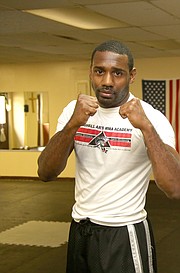
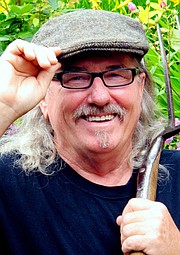
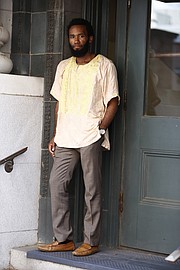
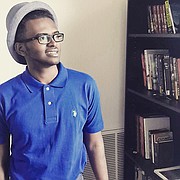
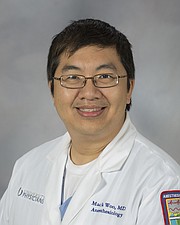
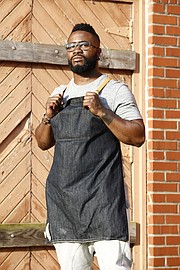


Comments
Use the comment form below to begin a discussion about this content.
comments powered by Disqus